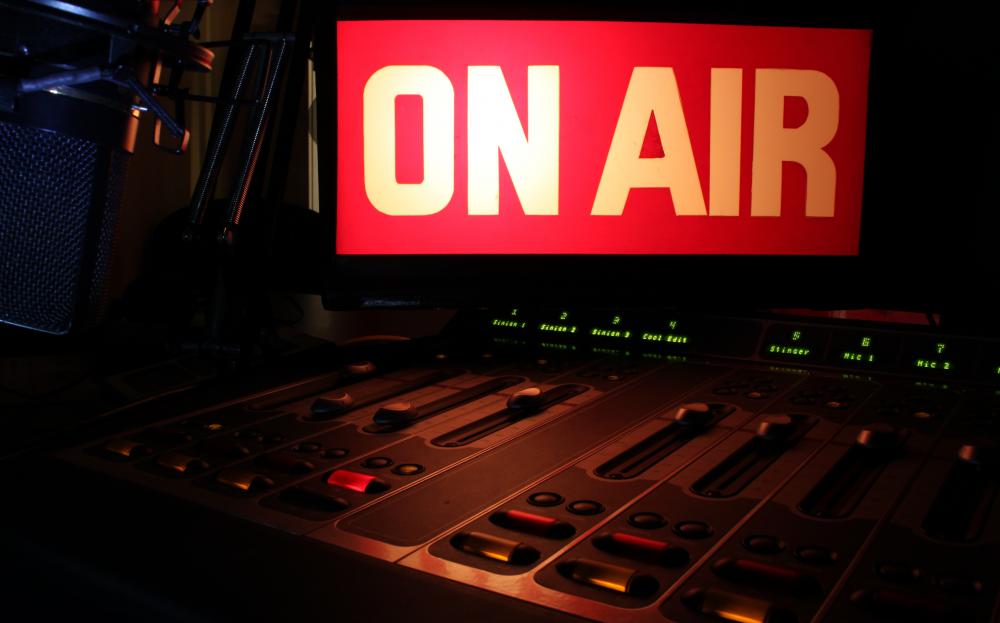At WiseGEEK, we're committed to delivering accurate, trustworthy information. Our expert-authored content is rigorously fact-checked and sourced from credible authorities. Discover how we uphold the highest standards in providing you with reliable knowledge.
What Are the Different Types of Radio Career Opportunities?
When one thinks of radio career opportunities, deejay positions often come to mind, as do talk radio personalities. These positions are common, but they can be difficult to get, and the candidate will need a fair amount of experience in order to secure the position. Other radio career opportunities exist, however, and some are completely unrelated to deejaying or talking on air. Advertising specialists and sales staff are almost always needed by radio stations, as are account executives, board operators, producers, production assistants, and even interns who may or may not be paid to learn the inner workings of a radio station.
Marketing personnel will create branding products or logos for the station. This may include physical advertisements such as banners, posters, ads in print media, or even brochures, but creating content for the radio will be the primary responsibility for the marketing department. These radio career opportunities may include marketing directors, assistants, and interns, as well as sales and events staff. Events staff will accompany a deejay or other personality to events outside of the studio to interact with the general public and advertise the brand of the radio station. Radio career opportunities in marketing often start with lower-level positions such as events staff.

Accounting radio career opportunities are almost always available. Running a radio station can be a complex endeavor, and money will have to be monitored carefully. The job of the accountant or accounting team will revolve around ensuring the business is making a profit, monitoring debt, paying bills, writing budgets, and managing those budgets throughout a fiscal year. These positions are likely to require a college degree in accounting, mathematics, or business. Some radio stations choose to outsource the accounting duties to an independent accounting firm, while larger stations are likely to have an accounting department on location.

Board operators are technicians who run the sound board and other related equipment during a broadcast. A deejay, or DJ, is likely to be responsible for some of these duties, but a board operator or technician will have more control over the equipment and may even be responsible for maintenance and repair of that equipment. Producers are the people who oversee the daily operations of the radio shows, and he or she will work with board operators and deejays to develop entertaining and relevant content for the station. The producer will also deal with the technical aspects of the radio shows, such as scheduling, timing, playlists, and more.
AS FEATURED ON:
AS FEATURED ON:













Discussion Comments
You could even think about having your own personal radio station. There are ways of doing this online. Or go in a similar vein and have a podcast.
This is really difficult though, particularly if you don't have a reputation or any experience. You need to make sure you aren't going to go broke or get yourself into trouble or anything like that.
@Mor - The best thing about those kinds of gigs is that it gives you a chance to build an audience.
I remember when the DJ of a local station who used to do pranks went a little bit too far and got arrested.
His station basically dropped him after that, but his fans were just as willing to listen to him on another station.
I'm sure that's how he managed to get another job so quickly. He built up a group of loyal fans who just wanted to listen to him, no matter where he was attached to.
After all, all the stations are much the same. It's the individual voice of the DJ that makes for interesting programs.
So, try to build up your own voice and style and maybe you will be able to build up some fans that could eventually help you get a job.
If you are really interested in being a DJ there are all kinds of opportunities for you to practice your craft in this day and age of the internet.
Most universities have their own radio station, for example and are often really eager for people to help them out by presenting a show.
You might not even have to have a music show, you might be able to focus on something else you are passionate about, or maybe something you are studying in class.
There are also lots of local stations which play over the internet that are often looking for announcers.
You won't get paid for these jobs, but I think finding a paying gig straight away without any experience is extremely difficult unless you are known as some kind of personality (for example, if you have a really successful blog).
Plus, to be honest it's harder than it seems and the practice certainly won't go astray.
Post your comments